The Impact of Digital Media and the Internet on Democratic Societies
VerifiedAdded on 2020/06/06
|6
|966
|55
Essay
AI Summary
This essay explores the arguments of cyber utopians regarding the impact of digital media and the Internet on breaking down national borders and fostering more interconnected and democratic societies. It examines the belief that digital media can dilute cultural differences, leading to a more globalized world. The essay also discusses the potential of digital media to interconnect societies globally and promote democratic values at an international level. While acknowledging the positive aspects, the analysis also considers negative impacts such as the potential for cultural integration challenges, the vulnerability of children to digital media's influence, the decrease in real-life interactions, and the increasing financial costs of political participation. The conclusion summarizes that digital media is a technological element that can be transferred through various electronic channels, impacting society in multifaceted ways.
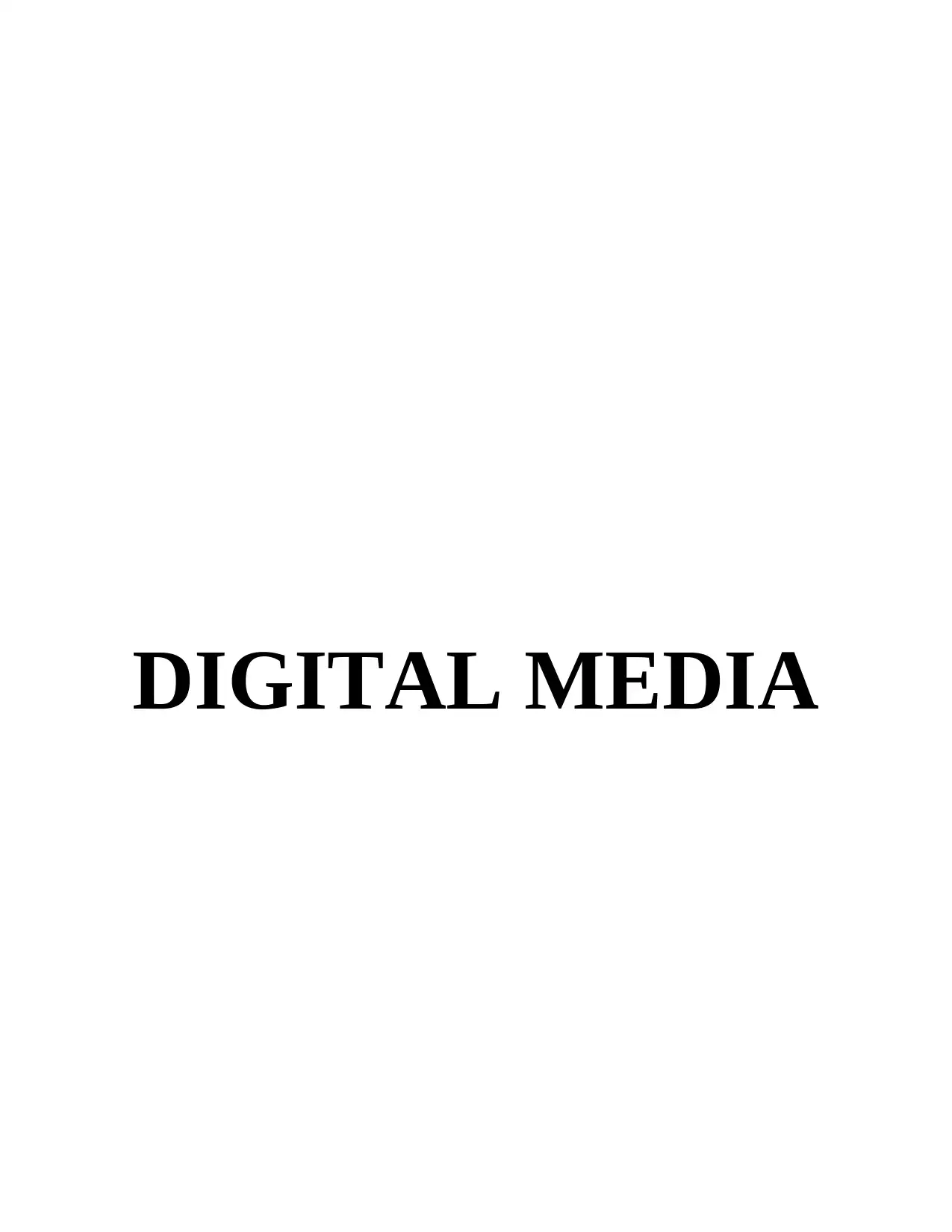
DIGITAL MEDIA
Paraphrase This Document
Need a fresh take? Get an instant paraphrase of this document with our AI Paraphraser
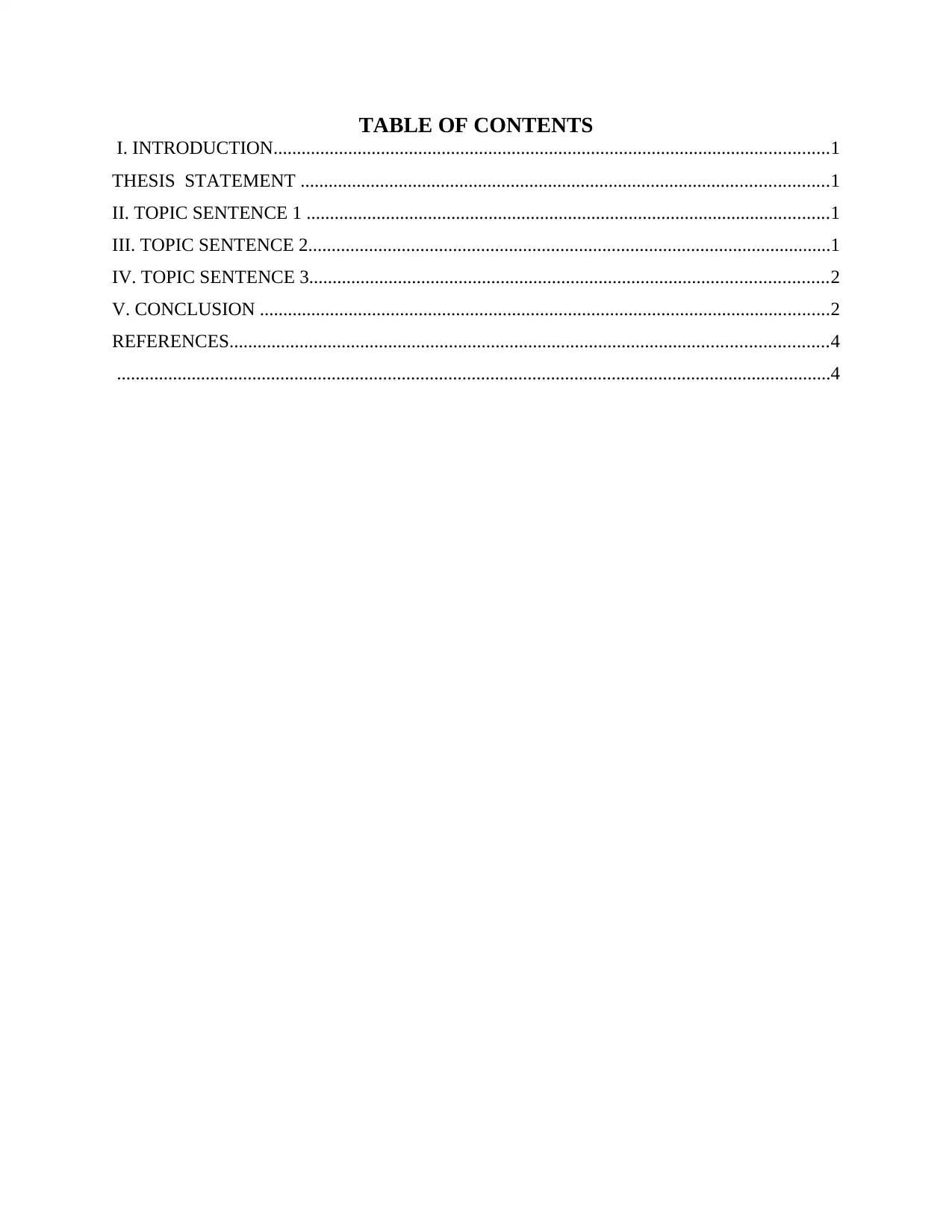
TABLE OF CONTENTS
I. INTRODUCTION.......................................................................................................................1
THESIS STATEMENT .................................................................................................................1
II. TOPIC SENTENCE 1 ................................................................................................................1
III. TOPIC SENTENCE 2................................................................................................................1
IV. TOPIC SENTENCE 3...............................................................................................................2
V. CONCLUSION ..........................................................................................................................2
REFERENCES................................................................................................................................4
.........................................................................................................................................................4
I. INTRODUCTION.......................................................................................................................1
THESIS STATEMENT .................................................................................................................1
II. TOPIC SENTENCE 1 ................................................................................................................1
III. TOPIC SENTENCE 2................................................................................................................1
IV. TOPIC SENTENCE 3...............................................................................................................2
V. CONCLUSION ..........................................................................................................................2
REFERENCES................................................................................................................................4
.........................................................................................................................................................4

⊘ This is a preview!⊘
Do you want full access?
Subscribe today to unlock all pages.

Trusted by 1+ million students worldwide
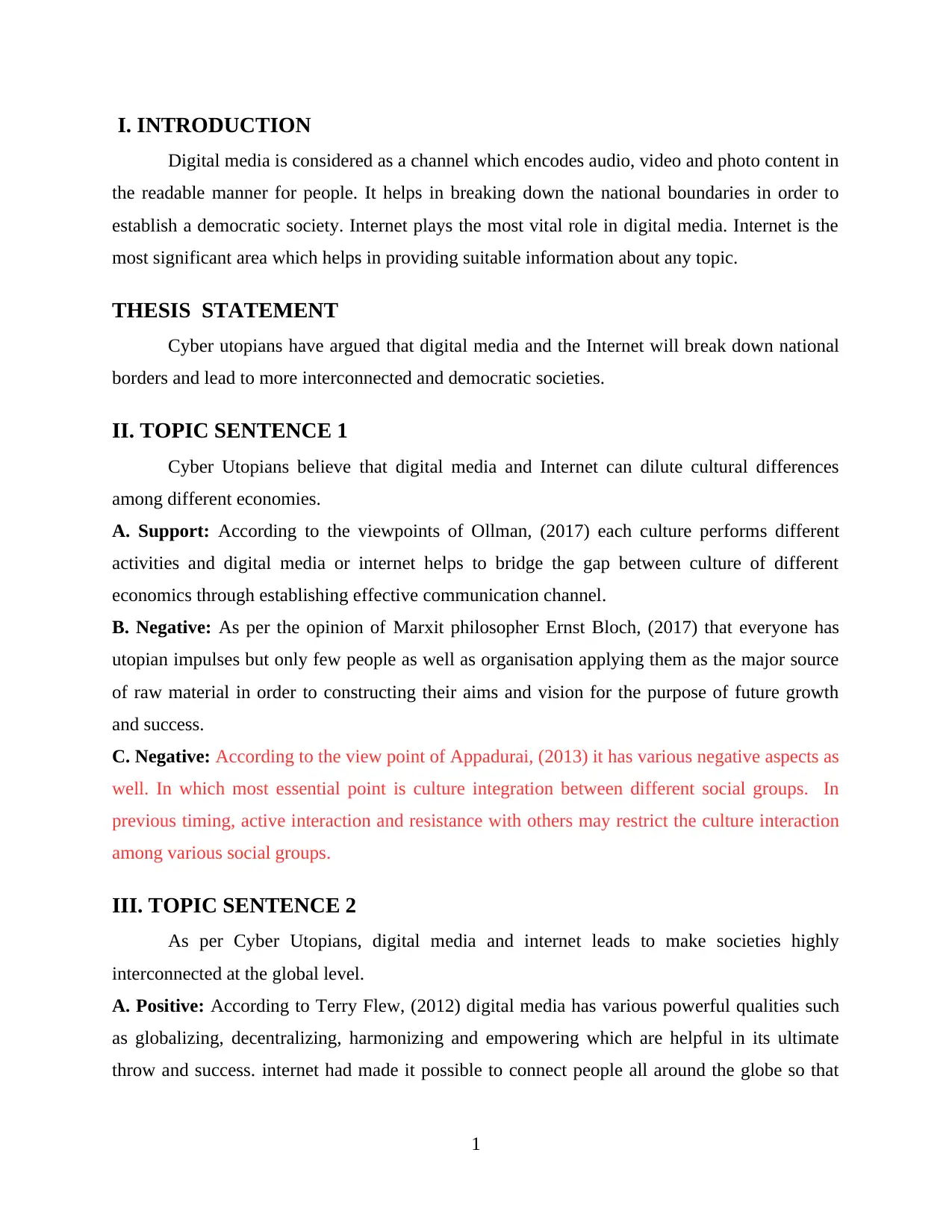
I. INTRODUCTION
Digital media is considered as a channel which encodes audio, video and photo content in
the readable manner for people. It helps in breaking down the national boundaries in order to
establish a democratic society. Internet plays the most vital role in digital media. Internet is the
most significant area which helps in providing suitable information about any topic.
THESIS STATEMENT
Cyber utopians have argued that digital media and the Internet will break down national
borders and lead to more interconnected and democratic societies.
II. TOPIC SENTENCE 1
Cyber Utopians believe that digital media and Internet can dilute cultural differences
among different economies.
A. Support: According to the viewpoints of Ollman, (2017) each culture performs different
activities and digital media or internet helps to bridge the gap between culture of different
economics through establishing effective communication channel.
B. Negative: As per the opinion of Marxit philosopher Ernst Bloch, (2017) that everyone has
utopian impulses but only few people as well as organisation applying them as the major source
of raw material in order to constructing their aims and vision for the purpose of future growth
and success.
C. Negative: According to the view point of Appadurai, (2013) it has various negative aspects as
well. In which most essential point is culture integration between different social groups. In
previous timing, active interaction and resistance with others may restrict the culture interaction
among various social groups.
III. TOPIC SENTENCE 2
As per Cyber Utopians, digital media and internet leads to make societies highly
interconnected at the global level.
A. Positive: According to Terry Flew, (2012) digital media has various powerful qualities such
as globalizing, decentralizing, harmonizing and empowering which are helpful in its ultimate
throw and success. internet had made it possible to connect people all around the globe so that
1
Digital media is considered as a channel which encodes audio, video and photo content in
the readable manner for people. It helps in breaking down the national boundaries in order to
establish a democratic society. Internet plays the most vital role in digital media. Internet is the
most significant area which helps in providing suitable information about any topic.
THESIS STATEMENT
Cyber utopians have argued that digital media and the Internet will break down national
borders and lead to more interconnected and democratic societies.
II. TOPIC SENTENCE 1
Cyber Utopians believe that digital media and Internet can dilute cultural differences
among different economies.
A. Support: According to the viewpoints of Ollman, (2017) each culture performs different
activities and digital media or internet helps to bridge the gap between culture of different
economics through establishing effective communication channel.
B. Negative: As per the opinion of Marxit philosopher Ernst Bloch, (2017) that everyone has
utopian impulses but only few people as well as organisation applying them as the major source
of raw material in order to constructing their aims and vision for the purpose of future growth
and success.
C. Negative: According to the view point of Appadurai, (2013) it has various negative aspects as
well. In which most essential point is culture integration between different social groups. In
previous timing, active interaction and resistance with others may restrict the culture interaction
among various social groups.
III. TOPIC SENTENCE 2
As per Cyber Utopians, digital media and internet leads to make societies highly
interconnected at the global level.
A. Positive: According to Terry Flew, (2012) digital media has various powerful qualities such
as globalizing, decentralizing, harmonizing and empowering which are helpful in its ultimate
throw and success. internet had made it possible to connect people all around the globe so that
1
Paraphrase This Document
Need a fresh take? Get an instant paraphrase of this document with our AI Paraphraser
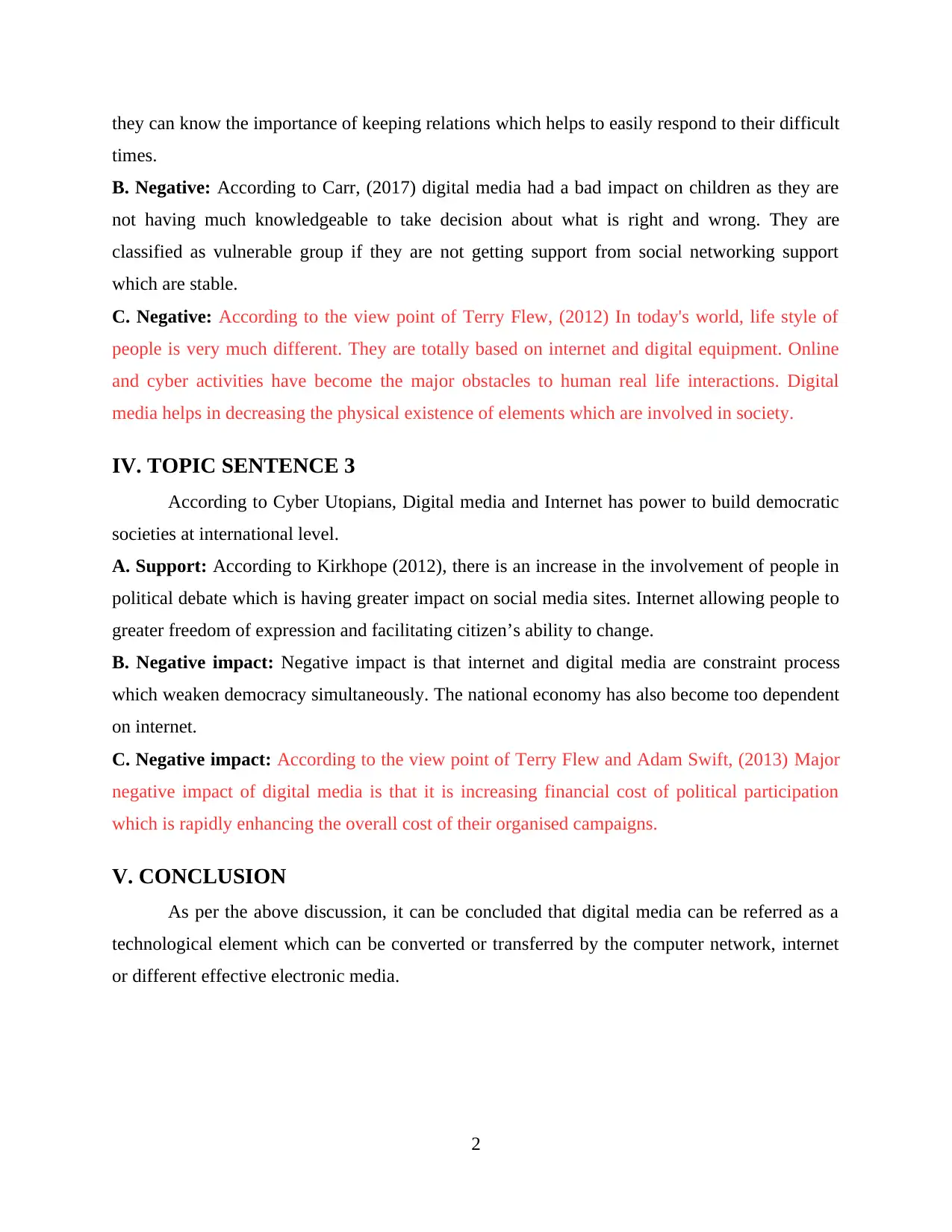
they can know the importance of keeping relations which helps to easily respond to their difficult
times.
B. Negative: According to Carr, (2017) digital media had a bad impact on children as they are
not having much knowledgeable to take decision about what is right and wrong. They are
classified as vulnerable group if they are not getting support from social networking support
which are stable.
C. Negative: According to the view point of Terry Flew, (2012) In today's world, life style of
people is very much different. They are totally based on internet and digital equipment. Online
and cyber activities have become the major obstacles to human real life interactions. Digital
media helps in decreasing the physical existence of elements which are involved in society.
IV. TOPIC SENTENCE 3
According to Cyber Utopians, Digital media and Internet has power to build democratic
societies at international level.
A. Support: According to Kirkhope (2012), there is an increase in the involvement of people in
political debate which is having greater impact on social media sites. Internet allowing people to
greater freedom of expression and facilitating citizen’s ability to change.
B. Negative impact: Negative impact is that internet and digital media are constraint process
which weaken democracy simultaneously. The national economy has also become too dependent
on internet.
C. Negative impact: According to the view point of Terry Flew and Adam Swift, (2013) Major
negative impact of digital media is that it is increasing financial cost of political participation
which is rapidly enhancing the overall cost of their organised campaigns.
V. CONCLUSION
As per the above discussion, it can be concluded that digital media can be referred as a
technological element which can be converted or transferred by the computer network, internet
or different effective electronic media.
2
times.
B. Negative: According to Carr, (2017) digital media had a bad impact on children as they are
not having much knowledgeable to take decision about what is right and wrong. They are
classified as vulnerable group if they are not getting support from social networking support
which are stable.
C. Negative: According to the view point of Terry Flew, (2012) In today's world, life style of
people is very much different. They are totally based on internet and digital equipment. Online
and cyber activities have become the major obstacles to human real life interactions. Digital
media helps in decreasing the physical existence of elements which are involved in society.
IV. TOPIC SENTENCE 3
According to Cyber Utopians, Digital media and Internet has power to build democratic
societies at international level.
A. Support: According to Kirkhope (2012), there is an increase in the involvement of people in
political debate which is having greater impact on social media sites. Internet allowing people to
greater freedom of expression and facilitating citizen’s ability to change.
B. Negative impact: Negative impact is that internet and digital media are constraint process
which weaken democracy simultaneously. The national economy has also become too dependent
on internet.
C. Negative impact: According to the view point of Terry Flew and Adam Swift, (2013) Major
negative impact of digital media is that it is increasing financial cost of political participation
which is rapidly enhancing the overall cost of their organised campaigns.
V. CONCLUSION
As per the above discussion, it can be concluded that digital media can be referred as a
technological element which can be converted or transferred by the computer network, internet
or different effective electronic media.
2
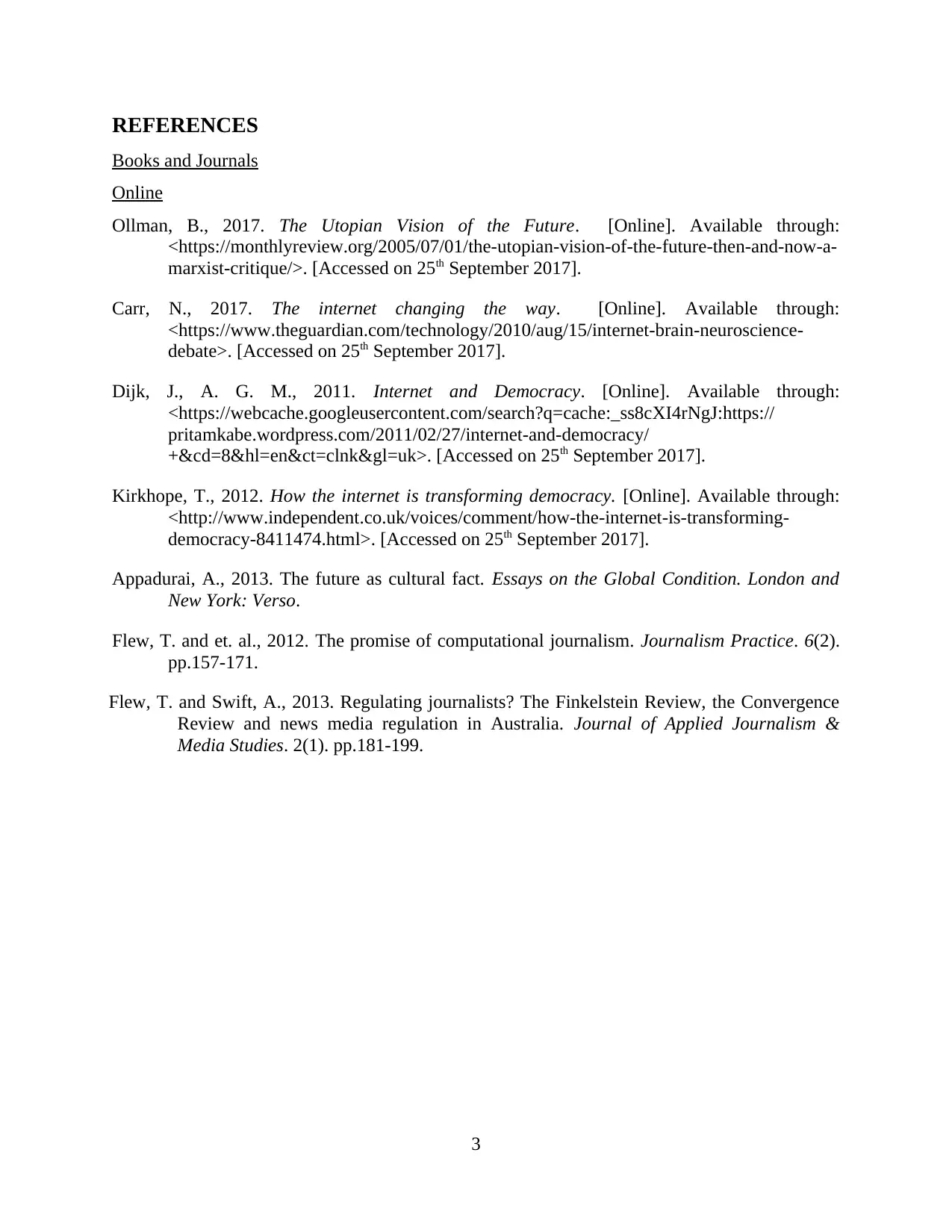
REFERENCES
Books and Journals
Online
Ollman, B., 2017. The Utopian Vision of the Future. [Online]. Available through:
<https://monthlyreview.org/2005/07/01/the-utopian-vision-of-the-future-then-and-now-a-
marxist-critique/>. [Accessed on 25th September 2017].
Carr, N., 2017. The internet changing the way. [Online]. Available through:
<https://www.theguardian.com/technology/2010/aug/15/internet-brain-neuroscience-
debate>. [Accessed on 25th September 2017].
Dijk, J., A. G. M., 2011. Internet and Democracy. [Online]. Available through:
<https://webcache.googleusercontent.com/search?q=cache:_ss8cXI4rNgJ:https://
pritamkabe.wordpress.com/2011/02/27/internet-and-democracy/
+&cd=8&hl=en&ct=clnk&gl=uk>. [Accessed on 25th September 2017].
Kirkhope, T., 2012. How the internet is transforming democracy. [Online]. Available through:
<http://www.independent.co.uk/voices/comment/how-the-internet-is-transforming-
democracy-8411474.html>. [Accessed on 25th September 2017].
Appadurai, A., 2013. The future as cultural fact. Essays on the Global Condition. London and
New York: Verso.
Flew, T. and et. al., 2012. The promise of computational journalism. Journalism Practice. 6(2).
pp.157-171.
Flew, T. and Swift, A., 2013. Regulating journalists? The Finkelstein Review, the Convergence
Review and news media regulation in Australia. Journal of Applied Journalism &
Media Studies. 2(1). pp.181-199.
3
Books and Journals
Online
Ollman, B., 2017. The Utopian Vision of the Future. [Online]. Available through:
<https://monthlyreview.org/2005/07/01/the-utopian-vision-of-the-future-then-and-now-a-
marxist-critique/>. [Accessed on 25th September 2017].
Carr, N., 2017. The internet changing the way. [Online]. Available through:
<https://www.theguardian.com/technology/2010/aug/15/internet-brain-neuroscience-
debate>. [Accessed on 25th September 2017].
Dijk, J., A. G. M., 2011. Internet and Democracy. [Online]. Available through:
<https://webcache.googleusercontent.com/search?q=cache:_ss8cXI4rNgJ:https://
pritamkabe.wordpress.com/2011/02/27/internet-and-democracy/
+&cd=8&hl=en&ct=clnk&gl=uk>. [Accessed on 25th September 2017].
Kirkhope, T., 2012. How the internet is transforming democracy. [Online]. Available through:
<http://www.independent.co.uk/voices/comment/how-the-internet-is-transforming-
democracy-8411474.html>. [Accessed on 25th September 2017].
Appadurai, A., 2013. The future as cultural fact. Essays on the Global Condition. London and
New York: Verso.
Flew, T. and et. al., 2012. The promise of computational journalism. Journalism Practice. 6(2).
pp.157-171.
Flew, T. and Swift, A., 2013. Regulating journalists? The Finkelstein Review, the Convergence
Review and news media regulation in Australia. Journal of Applied Journalism &
Media Studies. 2(1). pp.181-199.
3
⊘ This is a preview!⊘
Do you want full access?
Subscribe today to unlock all pages.

Trusted by 1+ million students worldwide
1 out of 6
Related Documents
Your All-in-One AI-Powered Toolkit for Academic Success.
+13062052269
info@desklib.com
Available 24*7 on WhatsApp / Email
![[object Object]](/_next/static/media/star-bottom.7253800d.svg)
Unlock your academic potential
Copyright © 2020–2025 A2Z Services. All Rights Reserved. Developed and managed by ZUCOL.





